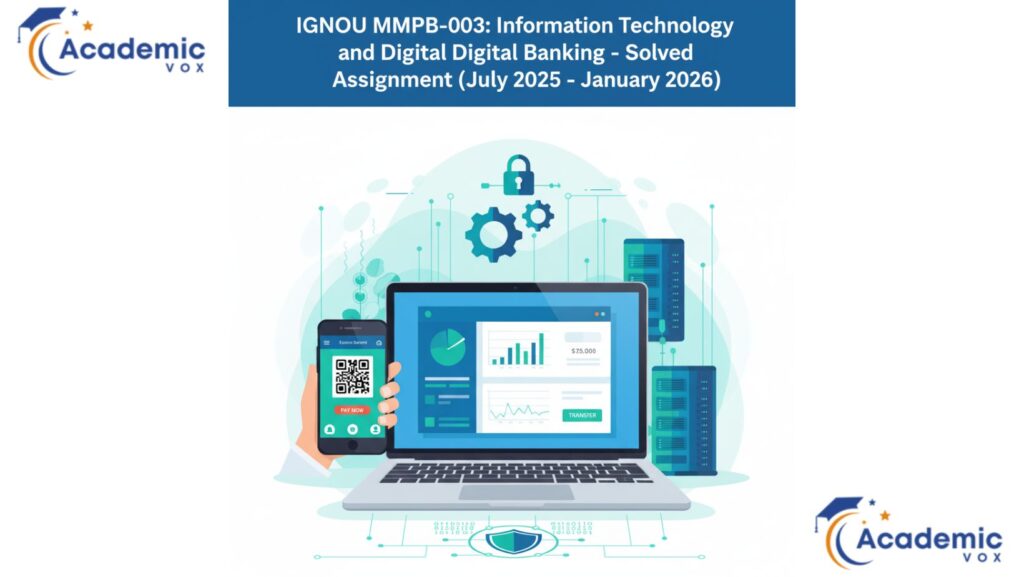IGNOU MMPB-003: Information Technology and Digital Banking – Solved Assignment (July 2025 – January 2026)

Introduction
The MMPB-003: Information Technology and Digital Banking course is a foundational part of the MBA (Banking & Finance) program at IGNOU. This course explores the use of information technology within the banking industry, with discussions in areas of information security, data management, digital payment systems, customer relationship management (CRM), and public key infrastructure (PKI).
This blog post offers an in-depth guide to MMPB-003 solved assignment for the July 2025 – January 2026 session. The assignment has five sections:
- Information Security Softwares and Fraud Risk Management
- Data Management Practices in Banks
- Retail Payment Systems
- Customer Relationship Management (CRM)
- Public Key Infrastructure (PKI)
Section A: Theoretical Questions
Q1: Describe the Information Security Softwares employed by banks. What are the characteristics of Fraud Risk Management Software?
Answer:
Banks employ several information security software to protect their online assets and facilitate safe transactions. Some of them are:
- Firewall Systems: Defend networks against unauthorized access.
- Encryption Tools: Safeguard data in transit and storage.
- Antivirus Software: Identify and destroy malicious codes.
- Intrusion Detection Systems (IDS): Inspect network traffic for suspicious behavior.
Fraud Risk Management Software helps banks detect, prevent, and manage fraud. Some of its key features are:
- Real-time Transaction Monitoring: Identifies abnormal patterns that are a sign of fraud.
- Case Management: Monitors and tracks fraud investigations.
- Reporting Tools: Produces compliance and analysis reports.
Q2: Select any bank of your choice and try to find out the various types of data used by the bank and the methods used for managing data. Also try to collect information about the practices and technologies that are used for protecting the data. Give a brief report of your findings.
Answer:
Note: The question necessitates practical research and cannot be answered in general terms. Students are requested to choose a bank and carry out research to compile the requisite information.
Q3: Attempt to determine from your bank or any other bank of your choice, the different types of Retail Payment Systems utilized by the bank. Report your findings.
Answer:
Note: This is a practical research question and cannot be answered in general. Students are recommended to choose a bank and research accordingly to provide correct information.
Q4: Define Customer Relationship Management (CRM). Why should banks use CRM software? Describe the elements of a CRM software. What are the applications of CRM in banks?
Answer:
Customer Relationship Management (CRM) is a tactic used by banks to handle contact with existing and potential clients. CRM software assists banks in streamlining operations, generating customer relationships, and enhancing profitability. CRM software components are:
- Customer Data Management: Stores, organizes, and maintains customer data.
- Sales Automation: Automates sales processes and monitors customer interactions.
- Marketing Automation: Automates marketing campaigns and customer segmentation.
- Customer Service Management: Resolves customer inquiries and issues.
Uses of CRM in banks:
- Improved Customer Service: Offers individualized services to customers.
- Sales Increase: Maximizes sales opportunities and leads management.
- Better Customer Retention: Fosters long-term customer relationships.
Q5: Define Public Key Infrastructure (PKI) and components of PKI. What are Advantages of PKI over Private Key System? What are Uses of PKI and difficulties in using PKI?
Answer:
Public Key Infrastructure (PKI) is an infrastructure that controls digital keys and certificates to protect electronic communications. Elements of PKI are:
- Public and Private Keys: Employed for encryption and decryption.
- Certificate Authority (CA): Provides digital certificates to authenticate identities.
- Registration Authority (RA): Serves as an intermediary between users and CA.
- Digital Certificates: Authenticate the identity of parties.
Benefits of PKI over Private Key System:
- Scalability: Accommodates many users.
- Security: Offers increased security via encryption.
- Non-repudiation: Guarantees that a transaction cannot be denied.
Applications of PKI:
- Secure Email Communication: Encrypts and signs email messages.
- Digital Signatures: Guarantees the authenticity of documents.
- Secure Web Browsing: Provides secure connections via HTTPS.
Limitations of using PKI:
- Complexity: Needs to be managed and configured properly.
- Cost: Includes costs for certificates and infrastructure.
- User Adoption: Needs users to comprehend and trust the system.
Section B: Practical Exercises
Note: Section B consists of practical exercises that need real-world interaction and cannot be given in a solved manner.
Section C: Project Work
Note: Section C needs the completion of a project that needs practical application and cannot be given in a solved manner.
Conclusion
The MMPB-003: Information Technology and Digital Banking course provides useful knowledge about incorporating technology within the banking industry. Through knowledge of the different areas of information security, data management, digital payments systems, CRM, and PKI, students are able to better prepare for the issues and prospects of the world of digital banking.
For more detailed answers and advice, the students are advised to consult the official IGNOU study materials and discuss with their tutors.
